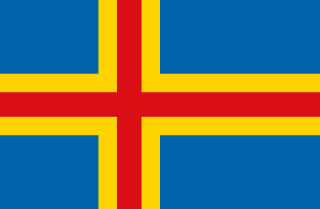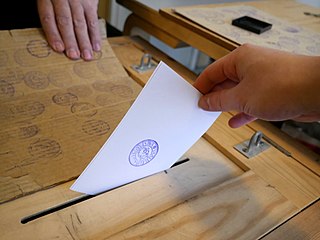
There are four types of elections in Finland. Each Finnish citizen at least 18 years of age has the right to vote in each of the elections, which decide the following: the president, the parliament, the MEPs, and the municipal and city councils.
Since the introduction of parliamentarism in Sweden, six national referendums have been held. Legal provisions for referendums were introduced in 1922, one year after the adoption of universal suffrage. The Constitution of Sweden provides for binding referendums, but all referendums held as of 2012 have been non-binding. The latest referendum, on adopting the euro, was held on 14 September 2003.

Referendums in the United Kingdom are occasionally held at a national, regional or local level. National referendums can be permitted by an Act of Parliament and regulated through the Political Parties, Elections and Referendums Act 2000, but they are by tradition extremely rare due to the principle of parliamentary sovereignty meaning that they cannot be constitutionally binding on either the Government or Parliament, although they usually have a persuasive political effect.
A referendum on joining the European Union was held in Norway on 27 and 28 November 1994. After a long period of heated debate, the "no" side won with 52.2 per cent of the vote, on a turnout of 88.6 per cent. Membership of what was then the European Community had previously been rejected in a 1972 referendum, and by French veto in 1962.

This is a list of referendums related to the European Union, or referendums related to the European Communities, which were predecessors of the European Union. Since 1972, a total of 48 referendums have been held by EU member states, candidate states, and their territories, with several additional referendums held in countries outside of the EU. The referendums have been held most commonly on the subject of whether to become a member of European Union as part of the accession process, although the EU does not require any candidate country to hold a referendum to approve membership or as part of treaty ratification. Other EU-related referendums have been held on the adoption of the euro and on participation in other EU-related policies.

The Archipelago Sea is a part of the Baltic Sea between the Gulf of Bothnia, the Gulf of Finland and the Sea of Åland, within Finnish territorial waters. By some definitions it contains the largest archipelago in the world by the number of islands, although many of the islands are very small and tightly clustered.

Finnish passports are issued to nationals of Finland for the purpose of international travel. Aside from serving as proof of Finnish nationality, they facilitate the process of securing assistance from Finnish consular officials abroad. Finnish passports share the standardised layout and burgundy-red cover with other EU countries.
Åland is an archipelago of over 6,000 islands in the Baltic Sea. Constitutionally, it is a Swedish-speaking autonomous province of Finland. Sea travel is a vital part of Åland's economy and a major local employer. The main ports are located at the capital Mariehamn in the south, at Berghamn in the west and at Långnäs on the east shore of Fasta Åland.

A referendum on European Union membership was held in Malta on 8 March 2003. A narrow majority voted in favour of joining but the opposition Labour Party rejected the results. The victory of the Nationalist Party in the 2003 general election confirmed the result of the referendum and Malta joined the EU on 1 May 2004.

There are five recognised candidates for future membership of the European Union: Turkey, North Macedonia, Montenegro, Albania, and Serbia. All except Albania and North Macedonia have started accession negotiations. Kosovo, whose independence is not recognised by five EU member states, and Bosnia and Herzegovina are recognised as potential candidates for membership by the EU. Bosnia and Herzegovina has formally submitted an application for membership, while Kosovo has a Stabilisation and Association Agreement (SAA) with the EU, which generally precedes the lodging of membership application. In July 2014, Jean-Claude Juncker announced that the EU has no plans to expand before 2019 while Serbia and Montenegro, the most advanced candidates, are expected to join before 2025. While the others are progressing, Turkish talks are at an effective standstill.
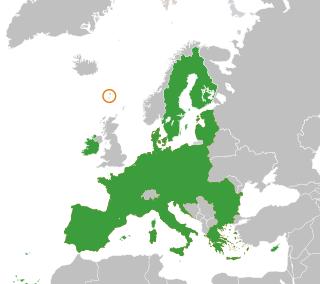
The Faroe Islands, a self-governing nation within the Kingdom of Denmark, is not part of the EU, as explicitly asserted by both Rome treaties.

The ratification of the Treaty of Lisbon was officially completed by all member states of the European Union on 13 November 2009 when the Czech Republic deposited its instrument of ratification with the Italian government. The Lisbon Treaty came into force on the first day of the month following the deposition of the last instrument of ratification with the government of Italy, which was 1 December 2009.

The 1995 enlargement of the European Union saw Austria, Finland, and Sweden accede to the European Union (EU). This was the EU's fourth enlargement and came into effect on 1 January of that year. All these states were previous members of the European Free Trade Association (EFTA) and had traditionally been less interested in joining the EU than other European countries. Norway had negotiated to join alongside the other three but following the signing of the treaty, membership was turned down by the Norwegian electorate in the 1994 national referendum. Switzerland also applied for membership on 26 May 1992, but withdrew it after a negative referendum result on 6 December 1992.

An advisory referendum on joining the European Union was held in Finland on 16 October 1994. 56.9% of voters approved of the proposal, with a voter turnout of 70.8%. Due to having its own customs jurisdiction, a separate referendum was held in the Åland Islands a month later, and was also approved.

The United Kingdom European Union membership referendum, also known as the EU referendum and the Brexit referendum, took place on 23 June 2016 in the United Kingdom (UK) and Gibraltar to ask the people if they wanted the country either to remain a member of or to leave the European Union (EU) under the provisions of the European Union Referendum Act 2015 and also the Political Parties, Elections and Referendums Act 2000. The referendum resulted in 51.9% of voters being in favour of leaving the EU. Although legally the referendum was non-binding, the government of that time had promised to implement the result, and it initiated the official EU withdrawal process on 29 March 2017, meaning that the UK is due to leave the EU before midnight on 29 March 2019, UK time, when the two-year period for Brexit negotiations expires.
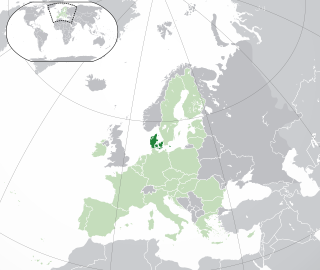
Denmark in the European Union refers to the historical and current issues of Denmark's membership in the European Union. Denmark has a permanent representation to the European Union led by ambassador Jeppe Tranholm-Mikkelsen, in Brussels. The current Foreign Minister and Minister for European Affairs is Anders Samuelsen.
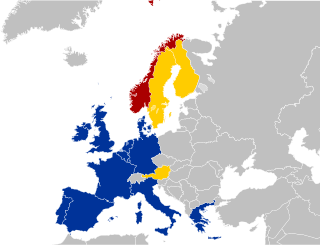
The Treaty of Accession 1994 was the agreement between the member states of the European Union and four countries, concerning these countries' accession into the EU. It entered into force on 1 January 1995. The Treaty arranged accession of Austria, Finland and Sweden to the EU and amended earlier Treaties of the European Union. As such it is an integral part of the constitutional basis of the European Union. Norway failed to join the EU because its referendum did not pass.

The 1973 enlargement of the European Communities was the first enlargement of the European Communities (EC), now the European Union (EU). Denmark, Ireland and the United Kingdom (UK) acceded to the EC on 1 January 1973. Gibraltar and Greenland also joined the EC as part of the United Kingdom and Denmark respectively, but the Faroe Islands, the British Overseas Territories and the Crown dependencies of the United Kingdom did not join the EC.

The European Union Referendum Act 2015(c. 36) is an Act of the Parliament of the United Kingdom that made legal provision for a pre-legislative advisory referendum to be held in the United Kingdom of Great Britain and Northern Ireland and Gibraltar, on whether it should remain a member state of the European Union or leave it. The bill was introduced to the House of Commons by Philip Hammond, Foreign Secretary on 28 May 2015. The Act was subsequently passed by 316-53 votes on its third reading in the Commons on 7 September 2015 and was approved by the House of Lords on 14 December 2015, and given Royal Assent on 17 December 2015 and came partly into force on the same day and came into full legal force on 1 February 2016.

Since the foundation of the European Communities, the United Kingdom has been an important neighbour and is currently a major member, until its withdrawal.


